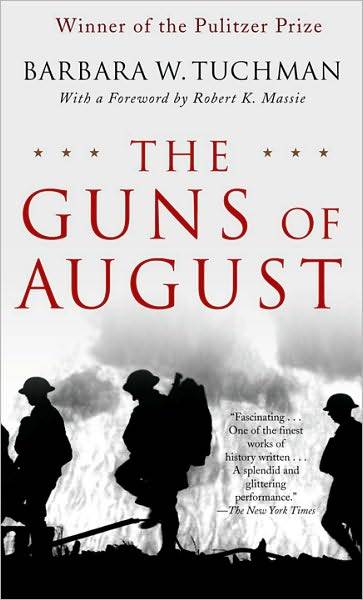To: Ravnagora
May I also recommend this: 
It’s World War One; there’s thirteen million killed; it was all because the militaries of both alliances believed they were so highly attuned to one another’s movements and dispositions, they could predict one another’s intentions, but all their theories were based on the last war. And the world and technology had changed, and those lessons were no longer valid, but it was all they knew, so the orders went out, couldn’t be rescinded. And your man in the field, his family at home, they couldn’t even tell you the reasons why their lives were being destroyed.
2 posted on
10/26/2013 12:10:01 PM PDT by
KC_Lion
(Build the America you want to live in at your address, and keep looking up.-Sarah Palin)
To: KC_Lion
What was the.fatality count for WII?
3 posted on
10/26/2013 12:14:03 PM PDT by
deadrock
(I am someone else.)
To: KC_Lion
Count me as a Max Hastings fan.
4 posted on
10/26/2013 12:31:35 PM PDT by
Eric in the Ozarks
("Say Not the Struggle Naught Availeth.")
To: KC_Lion
most of the blame for WW1 rests on the head of a narcisstic, incompetent, arrogant, petulant, childish, clinically insane ruler named wilhelm II. description sound familiar?
5 posted on
10/26/2013 12:32:51 PM PDT by
bravo whiskey
(We should not fear our government. Our government should fear us.)
To: KC_Lion
A Distant Mirror: The Calamitous 14th Century In this sweeping historical narrative, Barbara Tuchman writes of the cataclysmic 14th century, when the energies of medieval Europe were devoted to fighting internecine wars and warding off the plague. Some medieval thinkers viewed these disasters as divine punishment for mortal wrongs; others, more practically, viewed them as opportunities to accumulate wealth and power. One of the latter, whose life informs much of Tuchman's book, was the French nobleman Enguerrand de Coucy, who enjoyed the opulence and elegance of the courtly tradition while ruthlessly exploiting the peasants under his thrall. Tuchman looks into such events as the Hundred Years War, the collapse of the medieval church, and the rise of various heresies, pogroms, and other events that caused medieval Europeans to wonder what they had done to deserve such horrors.
FreeRepublic.com is powered by software copyright 2000-2008 John Robinson
